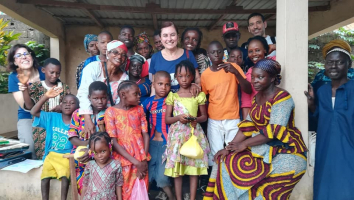Top 7 Equatorial Guinea Culture, Customs and Etiquette
Equatorial Guinea has a long history as a Portuguese colony. It is notable for the Bantu tribes, the Fang, and the Pygmies, and is now one of the world’s oil ... read more...sources. The country has had its share of political strife and, although the past was turbulent, its culture and heritage are well preserved. Let’s take a quick look at Equatorial Guinea's culture, customs, and etiquette.
-
One of the Equatorial Guinea cultures, customs, and etiquette that you should be aware of is music. Atanasio Ndongo Miyone wrote Equatorial Guinea's national anthem, which was adopted in 1968, when the country gained independence from Spain. Equatorial Guinea was formed from three former Spanish colonies: Ro Muni, a strip of land between Cameroon and Gabon; Bioko, an island near Cameroon; and Annobón, an island far from the mainland in the Atlantic Ocean.
The Fang are the largest ethnic group (85.7% (1994 census) of a total population of 704,001 (July 2013 est.)), with 6.5% Bubi and smaller populations of Mdowe (3.6%), Annobonese (1.6%), and Bujeba (1.1%), including smaller groups such as the Ndowe, Bisio, and Combe.
The Fang are famous for their mvet, a hybrid of a zither and a harp. The mvet has a maximum of fifteen strings. The semi-spherical part of this instrument is made of bamboo, and the strings are held together by fibers in the center. Music for the mvet is written in a musical notation that only initiates of the bebom-mvet society can learn. Music is typically call and response, with alternating chorus and drums. Folk styles have been popularized by musicians such as Eyi Moan Ndong.
The many dances in Equatorial Guinea, such as the balélé and the risque ibanga, are accompanied by a three- or four-person orchestra consisting of some arrangement of sanza, xylophone, drums, zithers, and bow harps. The tam-tam, a wooden box covered in animal skin, is another popular instrument. Bamboo keys with complete musical scales are installed in the center. A second type of tam-tam has two different musical key levels. Wooden musical instruments are typically decorated with fauna images and geometric drawings. Animal skins or animal drawings are used to cover drums.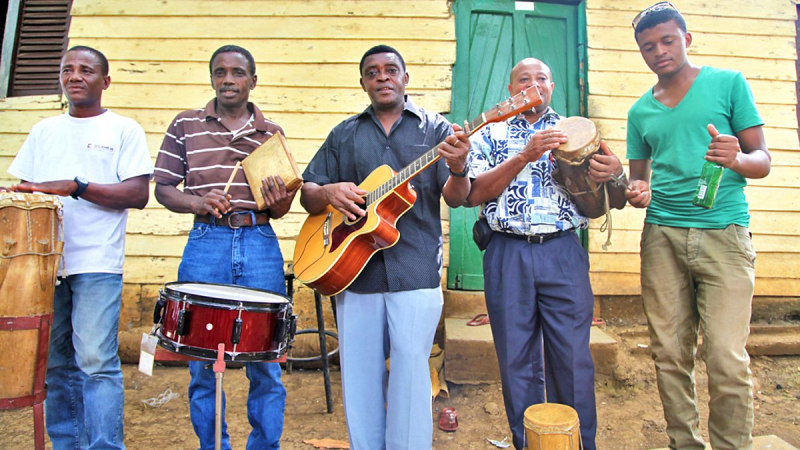
https://www.bbc.co.uk/ https://www.youtube.com/ -
The greeting is one of Equatorial Guinea's cultures, customs, and etiquette. When greetings to men, a warm handshake with the right hand and extended verbal greetings such as how are you, how is the family, how did you sleep, and so on are customary. Hugs are common among close friends and family. Handshakes tend to last a little longer, and some men will hold hands throughout their conversations. This is simply a symbol of close friendship. When greeting someone of higher status, it is customary in some cultures to bow slightly so that your head is lower than theirs, as a sign of great friendship/respect. Other groups, such as the Kissi, show respect by placing your left hand under your right forearm during a handshake.
Women greeting other women - In many situations, a warm handshake with the right hand and prolonged verbal greetings such as how are you, how is the family, how did you sleep, and so on are customary. Hugs are common among close friends and family. Some women also exchange two kisses on the cheek.
For religious reasons, some men will not shake hands with women, and vice versa. As a foreigner, you should wait for the woman to extend her hand, if at all. If you are unable to shake hands, clasping both hands in front of your heart is a suitable substitute.

https://www.liveabout.com/ 
https://www.vecteezy.com/ -
A lot of marriages are still arranged. A three-day wedding celebration of dancing and feasting marks the woman's acceptance into her husband's clan when two people marry. Negotiations between the two families on the bride price (paid to the bride's family) precede this celebration, which can be extremely high. Because of the cost, young people frequently enter into common-law relationships and have children before marrying. Any children born before the wedding technically belong to the woman's father, but when the groom pays the bride price and formally marries the woman, he can take the children. In the unlikely event of divorce, the bride price must be returned to the husband, who retains custody of the children while the woman returns to her family.
Extended family structures continue to dominate rural life, as they do in much of Africa, while nuclear families are more common in cities. "The family" refers to the entire clan, and it is often used to imply a village. Gender, age, and clan status all play a role in the power structure. Women have limited authority in this system, but they do control food production. Each wife in an extended family has her own kitchen or cooking fire, and she is in charge of it. The husband owns a house. Wives also share child care and household responsibilities.
Cousins are treated the same as siblings, and aunts and uncles are treated the same as mothers and fathers. Children must respect their elders, including older siblings, but especially their mothers and fathers. It is not uncommon for children to be placed in the care of other family members. Having six or more children is considered to be a sign of wealth, health, and virility. Women are responsible for growing food, cooking, cleaning, serving, hauling water and firewood, and raising children. Men are in charge of hunting, building and maintaining houses, making tools and baskets, and clearing the fincas (forested agricultural plots) twice a year.
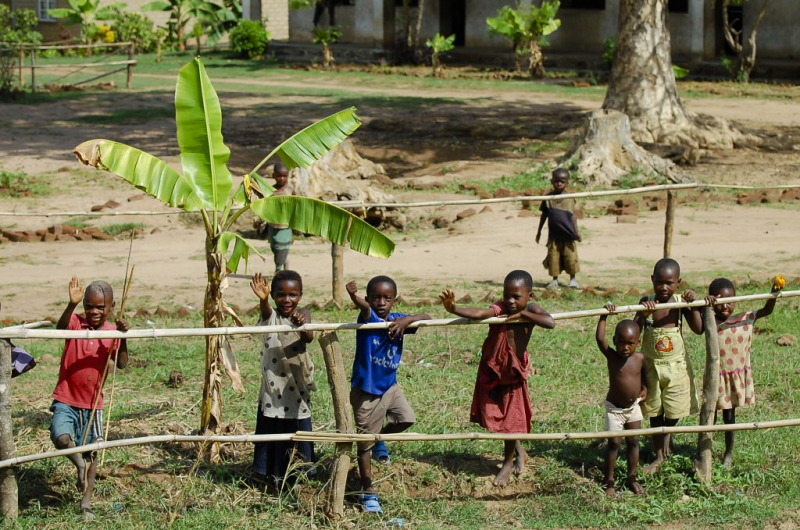
https://www.humanium.org/ 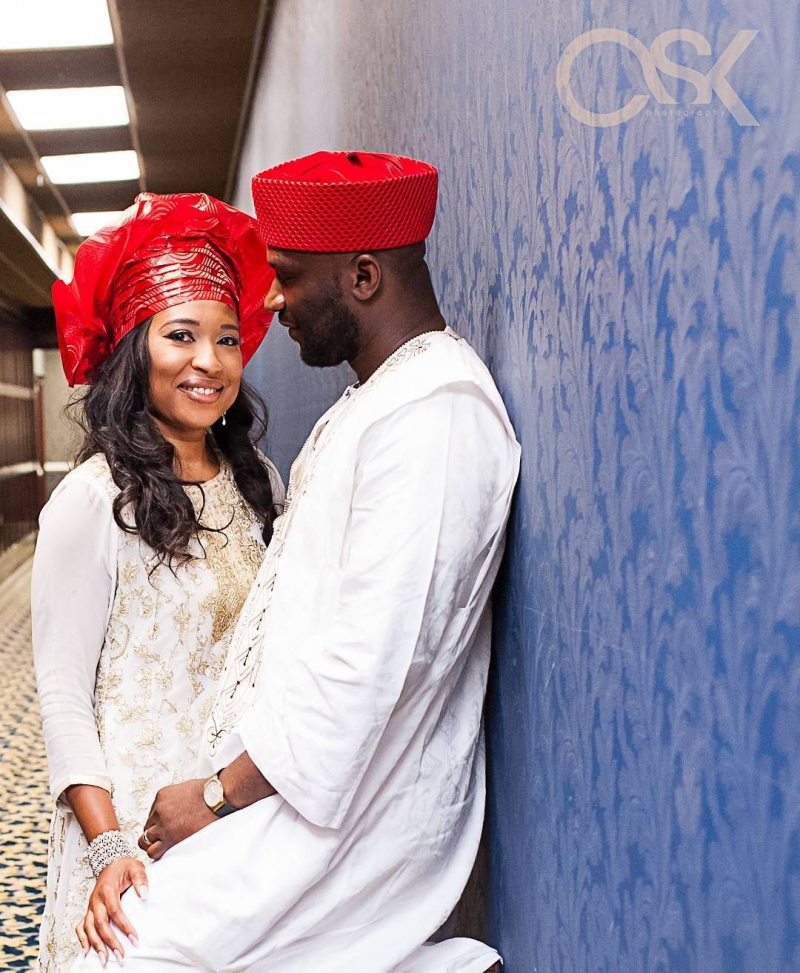
https://www.pinterest.com/ -
Dining in Equatorial Guinea is generally an informal and social event. Families typically eat together, often spending more time conversing than actually chewing food. A large percentage of Equatorial Guinea is Catholic, so if you are invited as a guest to a meal, you can expect a brief prayer before eating.
Copts do not eat dairy products or meat on Wednesdays and Fridays. Many Christians often abstain from dairy products during Lent. Muslims abstain from pork and alcohol. Among highlanders, adults and children eat separately. Among other Eritreans, families eat together, although children eat separately when guests are present. In such cases, the hostess serves the guests and eats later with the children.
To begin each meal, the oldest man blesses a piece of bread and distributes some to each person. Eating with the right hand from a large communal tray set on a low table is customary. Each person only eats the portion that is directly in front of him or her. Mealtime etiquette is stressed in Christian homes because it is believed that God is watching. Restaurants serve both traditional and Italian cuisine, which became popular during Eritrea's time as an Italian colony.
https://www.youtube.com/ https://www.youtube.com/ -
Festivals are an interesting aspect of Equatorial culture, customs, and etiquette to learn about. Citizens of Equatorial Guinea can participate in a variety of festivals and holidays throughout the year, including those associated with the majority Christian faith, such as Christmas. Other significant dates observed by the people of this African country include President's Day, Armed Forces Day, and Independence Day. President's Day is celebrated on June 5th, the birthday of Teodoro Obiang Nguema Mbasogo, who overthrew his dictator uncle during a military coup in 1979 and has been the president of Equatorial Guinea ever since. Armed Forces Day is observed on August 3rd and honors the accomplishments of the nation's military forces.
Equatorial Guinea celebrates its Independence Day on October 12th each year to commemorate the country's official independence from Spain. The Malabo Hip Hop Festival, which lasts ten days in December, and the Music Day Festival, which is sponsored in part by the nation's Ministry of Information, Culture, and Tourism, are two important festivals that take place in the country.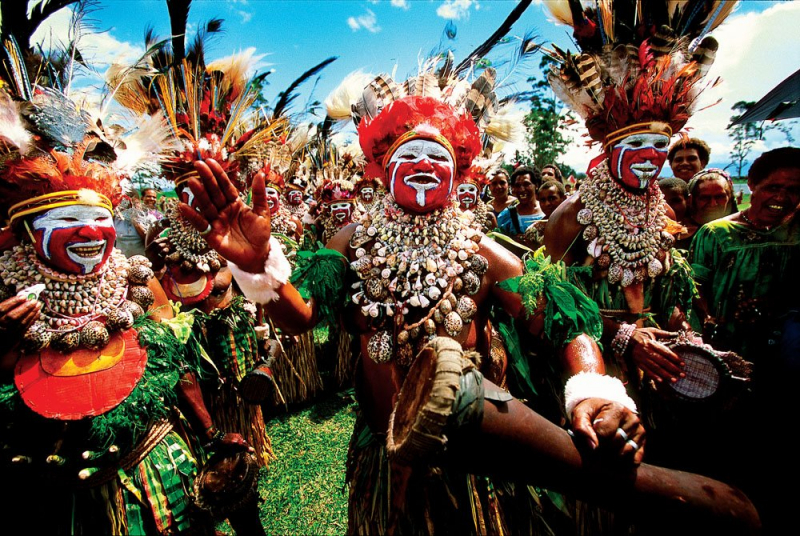
https://blog.goway.com/ 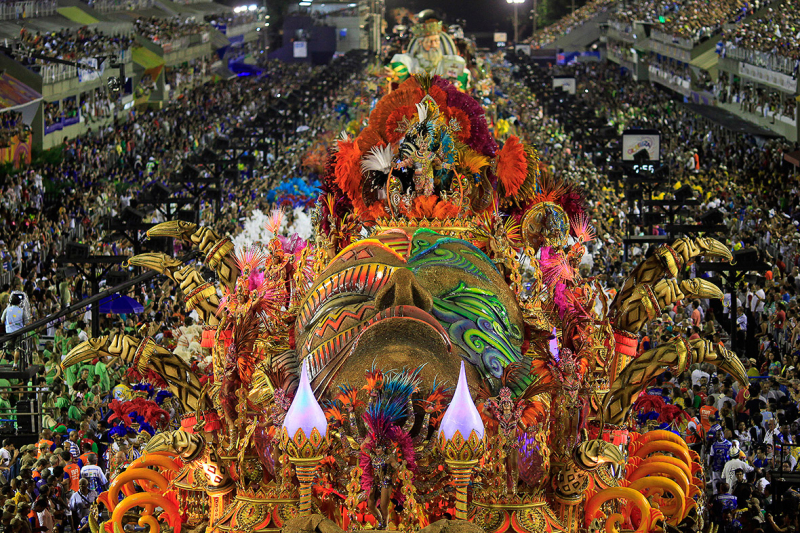
https://www.ibtimes.co.uk/ -
Due to the influence of Spanish culture and art, a large number of authors from Equatorial Guinea write in Spanish. In terms of history, the literary tradition in this African nation has evolved over the years and is usually broken down into three distinct categories; the Elder Generation (1900–1968), the Exiled Generation (1968–1985), and the Contemporary Generation (post 1985).
The writings of authors from the Elder Generation mainly used their art to write about the realities of Spanish colonial rule on the people of Equatorial Guinea, while many writers from the Exiled Generation were forcefully removed from their home country during the early years of political independence and the upheavals that followed. Contemporary authors are renowned for using their form of artistic expression as a way in which to explore a variety of social, cultural, and political aspects of the realities of life in modern Equatorial Guinea. Notable writers from Equatorial Guinea include Mara Nsué Angüe (1945–2017), Juan Tomás vila Laurel (born in 1966), Justo Bolekia Boleká (born 1954), and Leoncio Evita Enoy (1929–1996).
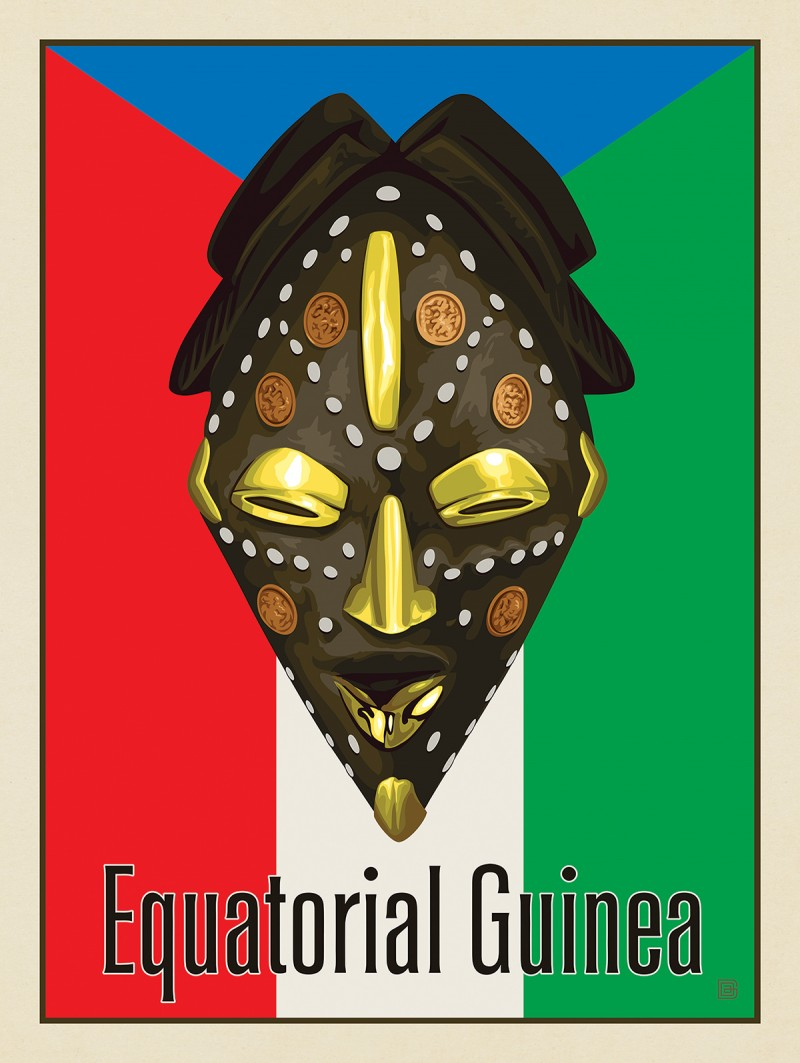
https://www.andersondesigngroupstore.com/ -
Most locals live in rural areas and prefer to dress in traditional African attire. Because of the country's colonial Spanish history, its legal system is based on both traditional African tribal law and the Spanish legal system. The country's government is extremely restrictive when it comes to providing its citizens with individual rights and freedoms. Because family units are responsible for the welfare of their individual members, caring for the elderly and sick is primarily a family responsibility.
As a result, extended families tend to co-habit, with multiple generations living together to share resources and labor. Many of the beliefs and social etiquette rules that govern daily life in Equatorial Guinea are based on tribal customs and traditions (particularly those of the Fang tribe). Polygyny, the practice of a man marrying more than one wife, is common, and female residents are required to follow strict rules of behavior based on long-held beliefs about male and female roles in society.
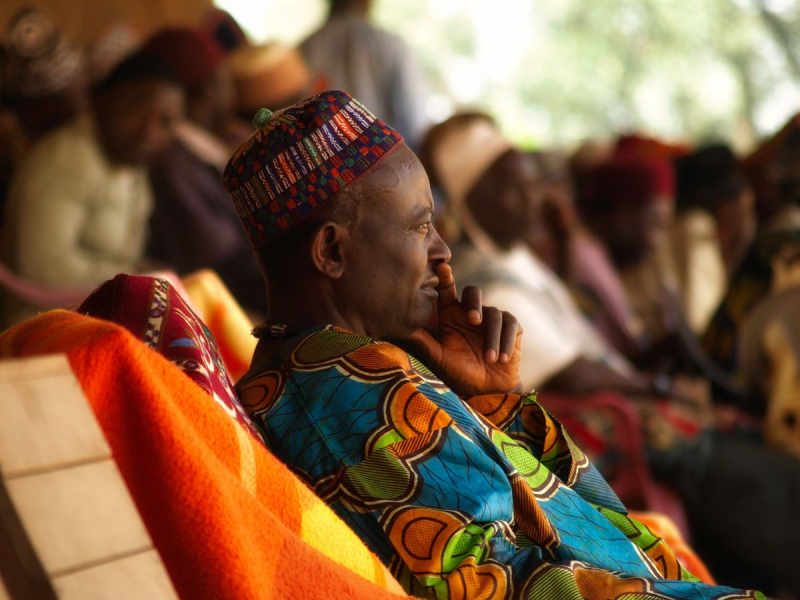
https://www.commisceo-global.com/ 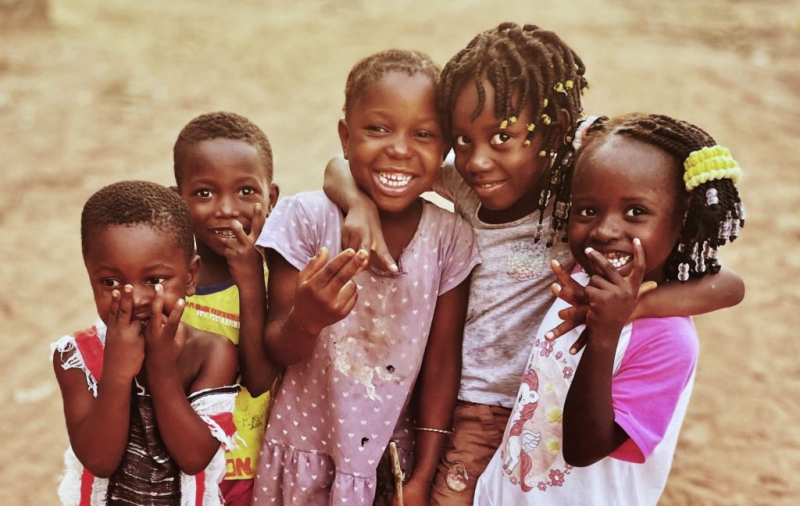
https://www.wavschools.org/










